Home
»Blog Insights
»The Complete Guide to Car Washing App Development: Build Your On-Demand Car Care Business
The Complete Guide to Car Washing App Development: Build Your On-Demand Car Care Business
Keyur Patel
September 12, 2025
10 min
“The best time to plant a tree was 20 years ago. The second best time is now.”
Market Statistics: The Booming Car Washing Industry
The car washing industry is on a strong growth trajectory, driven by rising vehicle ownership, urban convenience needs, and the rapid adoption of mobile-first services. According to Research & Markets (2025), the global car wash services market grew from USD 33.94 billion in 2024 to USD 35.82 billion in 2025 and is projected to reach USD 47.14 billion by 2030, reflecting a CAGR of nearly 5.6%. Meanwhile, Future Market Insights (2025) projects the mobile car wash and detailing market to expand from USD 126.26 billion in 2025 to an impressive USD 282.85 billion by 2035, highlighting the massive potential for on-demand, app-based solutions.
Consequently, entrepreneurs are increasingly recognizing the massive potential in developing comprehensive car washing mobile applications. Therefore, this guide will walk you through everything you need to know about car washing app development.
Why Should You Invest in Car Washing App Development?
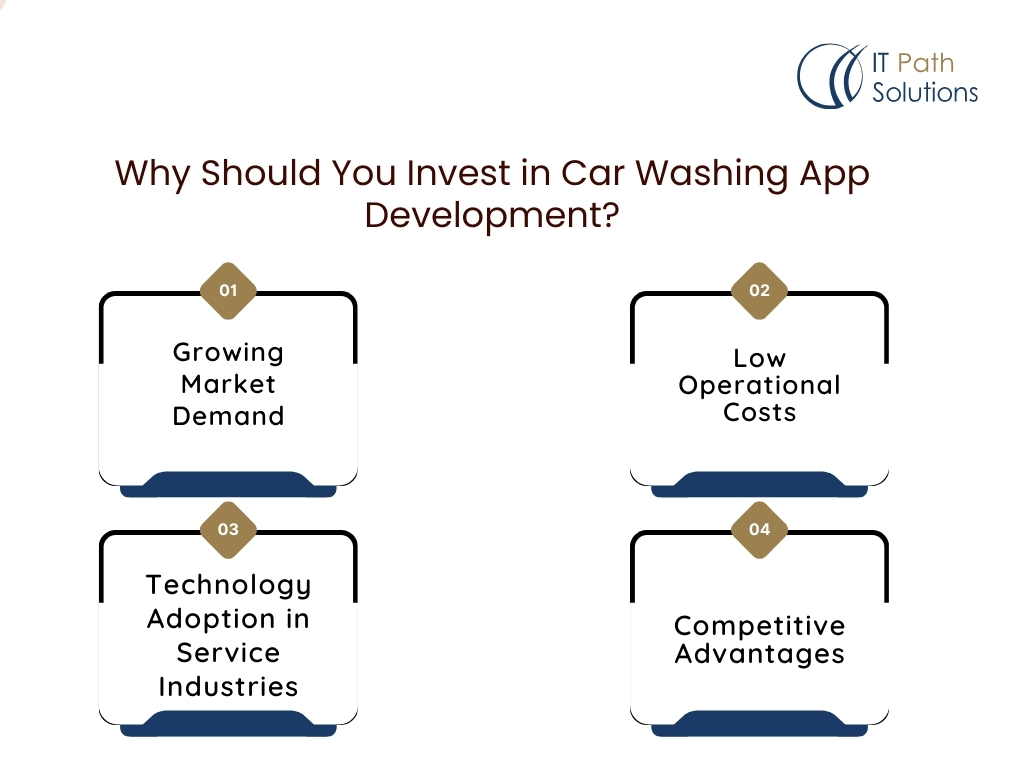
Growing Market Demand
First and foremost, consumer behavior has fundamentally shifted toward on-demand services. Similarly, busy professionals and families are actively seeking convenient solutions that save time while delivering quality results. Additionally, the rise of subscription-based services has created new revenue models that generate predictable, recurring income streams.
Low Operational Costs
Furthermore, app-based car washing businesses require significantly lower overhead costs compared to traditional brick-and-mortar car wash facilities. Consequently, entrepreneurs can start with minimal investment while scaling operations gradually. Moreover, the subscription model ensures steady cash flow and improved customer lifetime value.
Technology Adoption in Service Industries
Similarly, mobile app development has revolutionized service industries by connecting service providers directly with customers. Therefore, car washing apps eliminate intermediaries while providing seamless user experiences. Additionally, integrated payment systems and GPS tracking enhance operational efficiency substantially.
Competitive Advantages
Furthermore, early movers in local markets can establish strong brand recognition and customer loyalty. Consequently, businesses that invest in professional mobile app development gain significant competitive advantages over traditional service providers.
What Features Should Your Car Washing App Include?
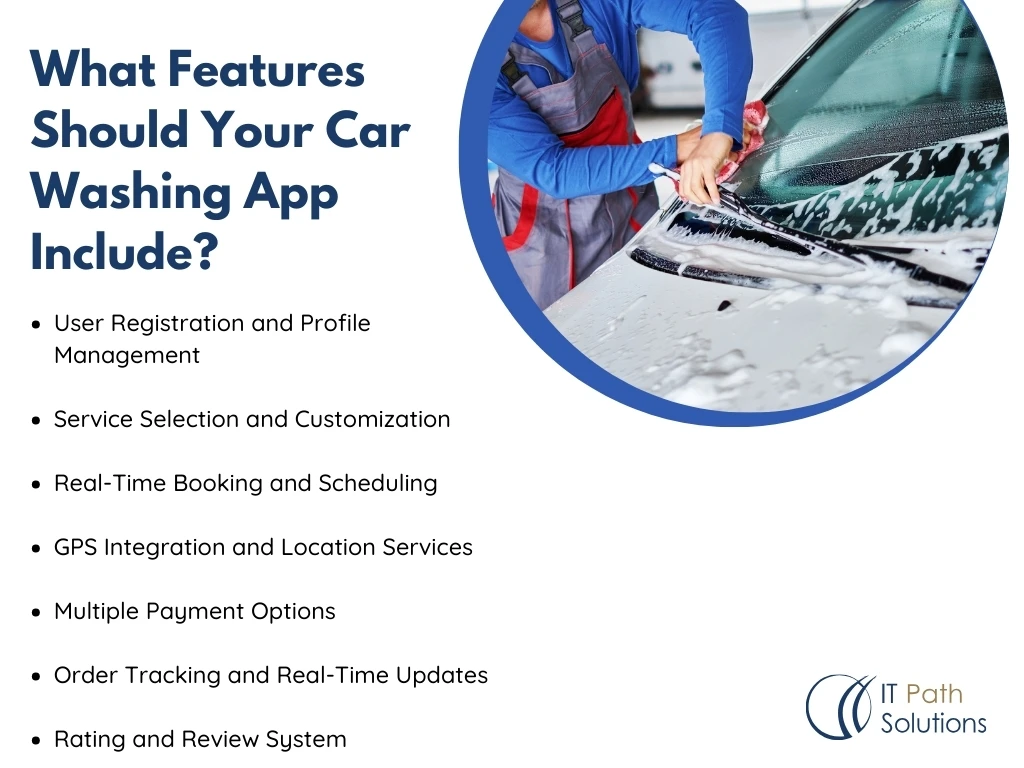
Essential Customer-Facing Features
User Registration and Profile Management
Initially, your app should provide seamless onboarding experiences through social media integration or email registration. Subsequently, users can manage personal information, vehicle details, and service preferences efficiently.
Service Selection and Customization
Moreover, customers need intuitive interfaces to browse available services, compare pricing, and select add-on options. Consequently, clear service descriptions with pricing transparency build trust and encourage bookings.
Real-Time Booking and Scheduling
Additionally, the app should offer flexible scheduling options including immediate bookings and advance reservations. Furthermore, calendar integration and reminder notifications improve user engagement significantly.
GPS Integration and Location Services
Similarly, accurate location detection ensures service providers can find customers easily. Therefore, integrated maps with real-time navigation reduce confusion and improve service delivery.
Multiple Payment Options
Furthermore, secure payment gateways supporting credit cards, digital wallets, and mobile payments are essential. Additionally, saved payment methods and subscription billing streamline the checkout process.
Order Tracking and Real-Time Updates
Moreover, customers expect real-time updates about service provider location, estimated arrival times, and service progress. Consequently, push notifications keep users informed throughout the entire service experience.
Rating and Review System
Additionally, feedback mechanisms help maintain service quality while building trust with potential customers. Furthermore, review systems encourage service providers to maintain high performance standards.
Advanced Customer Features
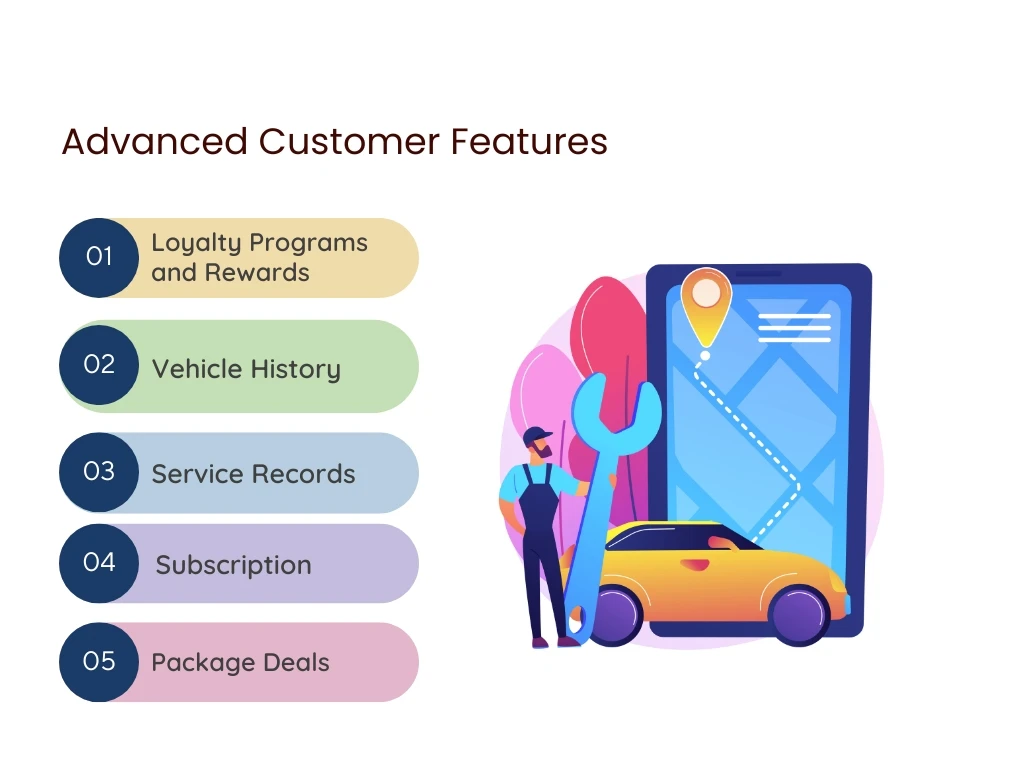
Loyalty Programs and Rewards
Furthermore, gamification elements like points, badges, and referral bonuses increase customer retention. Consequently, loyalty programs encourage repeat bookings and word-of-mouth marketing.
Vehicle History and Service Records
Similarly, comprehensive service histories help customers track maintenance schedules and service frequency. Therefore, automated reminders for regular cleaning improve customer engagement.
Subscription and Package Deals
Moreover, subscription models provide customers with cost savings while ensuring predictable revenue for businesses. Additionally, flexible package options cater to different customer segments and usage patterns.
Service Provider Features
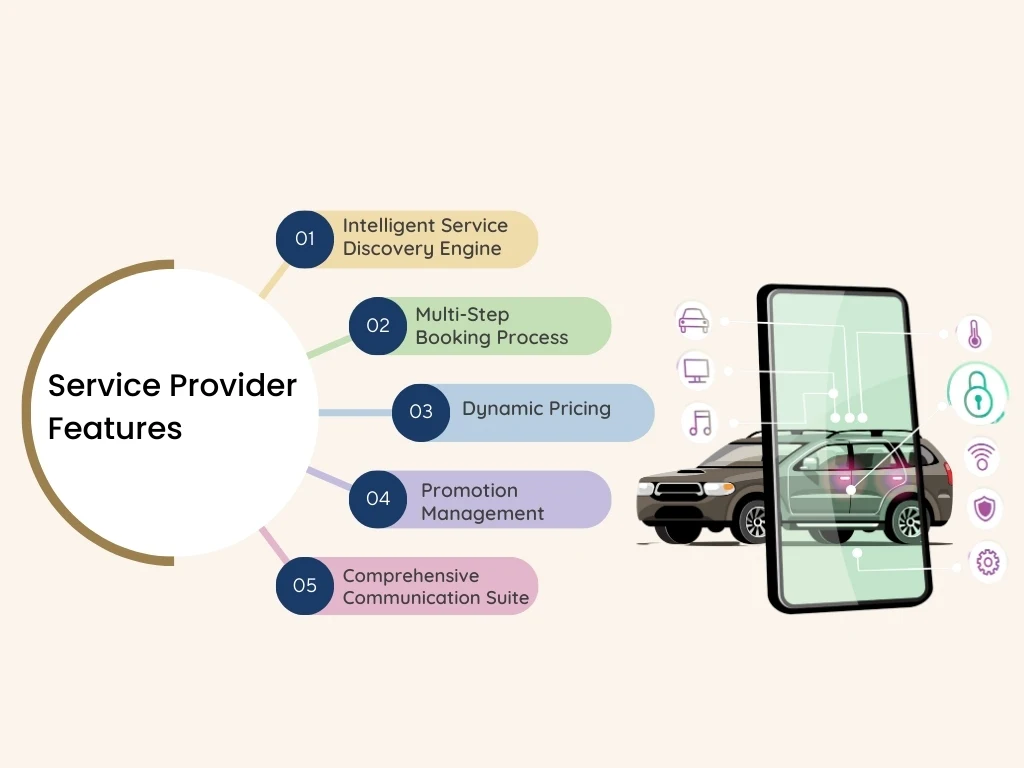
Provider Registration and Verification
Initially, thorough vetting processes ensure service quality and customer safety. Subsequently, background checks and skill verification maintain platform credibility.
Job Management Dashboard
Furthermore, service providers need comprehensive dashboards to manage bookings, track earnings, and communicate with customers. Consequently, efficient job management tools improve provider satisfaction and retention.
Route Optimization
Similarly, intelligent routing algorithms help service providers optimize travel time and fuel costs. Therefore, efficient scheduling increases daily earning potential substantially.
Earnings and Analytics
Additionally, detailed earnings reports and performance analytics help providers understand their business metrics. Furthermore, transparent payment systems build trust and encourage provider loyalty.
Administrative Features
Comprehensive Admin Panel
Moreover, business owners require powerful admin panels to manage operations, monitor performance, and generate reports. Consequently, centralized control systems streamline business management significantly.
Customer and Provider Management
Furthermore, admin interfaces should facilitate user management, dispute resolution, and account monitoring. Additionally, communication tools enable direct interaction with both customers and service providers.
Financial Management and Reporting
Similarly, integrated financial systems track revenue, commissions, and expenses automatically. Therefore, detailed reports help businesses make data-driven decisions for growth.
Marketing and Promotional Tools
Additionally, built-in marketing features like discount codes, promotional campaigns, and push notifications drive user acquisition and retention.
How to Develop a Successful Car Washing App
Phase 1: Market Research and Planning
Identify Your Target Audience
Initially, conduct thorough market research to understand customer demographics, preferences, and pain points. Subsequently, create detailed user personas to guide development decisions effectively.
Analyze Competitors
Furthermore, study existing car washing apps to identify gaps in the market and differentiation opportunities. Consequently, competitive analysis helps position your app strategically.
Define Your Business Model
Moreover, choose appropriate revenue models such as commission-based, subscription, or hybrid approaches. Additionally, consider pricing strategies that balance profitability with customer acquisition.
Phase 2: Technology Stack Selection
Frontend Development
Furthermore, choose between native app development (iOS/Android) or cross-platform solutions like React Native or Flutter. Consequently, consider factors like performance requirements, budget constraints, and time-to-market.
Backend Development
Similarly, select robust backend technologies that can scale with business growth. Therefore, cloud-based solutions like AWS, Google Cloud, or Azure provide reliability and scalability.
Database Management
Additionally, choose appropriate database systems for handling user data, booking information, and payment records securely. Furthermore, consider both relational and NoSQL databases based on specific requirements.
Integration Requirements
Moreover, plan integrations with payment gateways, mapping services, push notification services, and analytics platforms. Consequently, seamless third-party integrations enhance user experience significantly.
Phase 3: UI/UX Design
User-Centric Design Approach
Initially, prioritize intuitive navigation and clean interfaces that minimize friction in the booking process. Subsequently, conduct user testing to validate design decisions throughout development.
Responsive Design
Furthermore, ensure your app works seamlessly across different device sizes and operating systems. Additionally, consider accessibility guidelines to accommodate users with disabilities.
Brand Identity Integration
Similarly, incorporate consistent branding elements that reinforce your company’s identity and values. Therefore, cohesive design language builds brand recognition and trust.
Phase 4: Mobile App Development Process
MVP Development
Moreover, start with a Minimum Viable Product that includes core features for launching quickly. Consequently, MVP approach allows for faster market entry and early user feedback collection.
Agile Development Methodology
Furthermore, implement agile development practices with regular sprints and stakeholder feedback. Additionally, iterative development ensures the final product meets user expectations effectively.
Quality Assurance and Testing
Similarly, comprehensive testing across multiple devices and scenarios prevents critical bugs in production. Therefore, invest in both automated and manual testing processes.
Security Implementation
Additionally, implement robust security measures to protect user data and payment information. Furthermore, comply with data protection regulations like GDPR and CCPA.
Phase 5: Launch and Marketing Strategy
App Store Optimization
Moreover, optimize your app listings with relevant keywords, compelling descriptions, and attractive screenshots. Consequently, ASO improves organic discovery and download rates.
Digital Marketing Campaign
Furthermore, develop comprehensive marketing strategies including social media marketing, content marketing, and paid advertising. Additionally, local SEO helps target customers in specific geographic areas.
Partnership Development
Similarly, establish partnerships with local businesses, apartment complexes, and corporate offices. Therefore, B2B partnerships can provide steady customer acquisition channels.
Technical Development Considerations
Scalability Planning
Initially, architect your application to handle increased user loads and geographic expansion. Subsequently, cloud-based infrastructure enables seamless scaling as your business grows.
API Development
Furthermore, well-designed APIs facilitate third-party integrations and future feature additions. Consequently, RESTful API architecture ensures maintainability and flexibility.
Data Analytics Integration
Moreover, implement comprehensive analytics to track user behavior, service performance, and business metrics. Additionally, data-driven insights guide optimization and growth strategies.
Offline Functionality
Similarly, consider offline capabilities for areas with poor internet connectivity. Therefore, cached data and sync mechanisms ensure consistent user experience.
Cost Factors in Car Washing App Development
Development Team Structure
Initially, decide between in-house development, outsourcing, or hybrid approaches based on budget and timeline requirements. Subsequently, consider the expertise level required for different development phases.
Technology Licensing
Furthermore, factor in costs for third-party services, APIs, and development tools. Additionally, consider ongoing subscription costs for cloud services and analytics platforms.
Marketing and Launch Expenses
Moreover, allocate budget for marketing campaigns, app store fees, and promotional activities. Consequently, successful launches require significant marketing investment beyond development costs.
Maintenance and Updates
Similarly, plan for ongoing maintenance, security updates, and feature enhancements. Therefore, budget approximately 15-20% of development costs annually for maintenance.
Monetization Strategies
Commission-Based Revenue
Furthermore, charge service providers a percentage of each completed booking. Consequently, this model aligns platform success with provider earnings.
Subscription Models
Additionally, offer premium subscriptions with benefits like priority booking, discounts, and exclusive services. Moreover, subscription models provide predictable recurring revenue.
Advertisement Revenue
Similarly, partner with automotive brands and local businesses for in-app advertising opportunities. Therefore, targeted advertising can generate additional revenue streams.
Service Markup
Furthermore, add markup to service prices while maintaining competitive rates. Consequently, transparent pricing builds customer trust while generating revenue.
Future Trends and Innovations
Staying ahead of technological trends ensures your car washing app remains competitive and relevant in the rapidly evolving mobile app landscape. Moreover, incorporating emerging technologies creates differentiation opportunities while positioning your business for future growth and market leadership.
Artificial Intelligence Integration
Moreover, AI-powered features like demand prediction, pricing optimization, and customer service chatbots enhance operational efficiency. Additionally, machine learning algorithms improve service matching and route optimization.
IoT Connectivity
Furthermore, Internet of Things integration enables smart scheduling based on weather conditions and vehicle usage patterns. Consequently, IoT features provide personalized service recommendations.
Augmented Reality Features
Similarly, AR technology can help customers visualize service options and results. Therefore, innovative features differentiate your app from competitors.
Environmental Sustainability
Additionally, eco-friendly service options and waterless cleaning technologies appeal to environmentally conscious consumers. Furthermore, sustainability initiatives can become strong marketing differentiators.
Conclusion: Building Your Car Washing App Success
Ultimately, car washing app development represents a significant opportunity in the growing on-demand services market. Furthermore, successful implementation requires careful planning, robust technology choices, and customer-centric design approaches.
Moreover, businesses that invest in professional mobile app development services gain competitive advantages while building scalable revenue streams. Additionally, the combination of recurring subscription models and efficient operations creates sustainable business growth.
Therefore, entrepreneurs ready to enter this lucrative market should partner with experienced mobile app development companies that understand both technical requirements and business objectives. Consequently, professional development teams can navigate complex challenges while delivering high-quality applications that drive business success.
Finally, remember that successful car washing apps solve real customer problems while providing exceptional user experiences. Furthermore, continuous improvement based on user feedback ensures long-term success in this competitive market.
Are you ready to transform your car washing business idea into a successful mobile application? Subsequently, contact professional app development experts who can guide you through every step of the development process.

Keyur Patel
Co-Founder
Keyur Patel is the director at IT Path Solutions, where he helps businesses develop scalable applications. With his extensive experience and visionary approach, he leads the team to create futuristic solutions. Keyur Patel has exceptional leadership skills and technical expertise in Node.js, .Net, React.js, AI/ML, and PHP frameworks. His dedication to driving digital transformation makes him an invaluable asset to the company.
Related Blog Posts
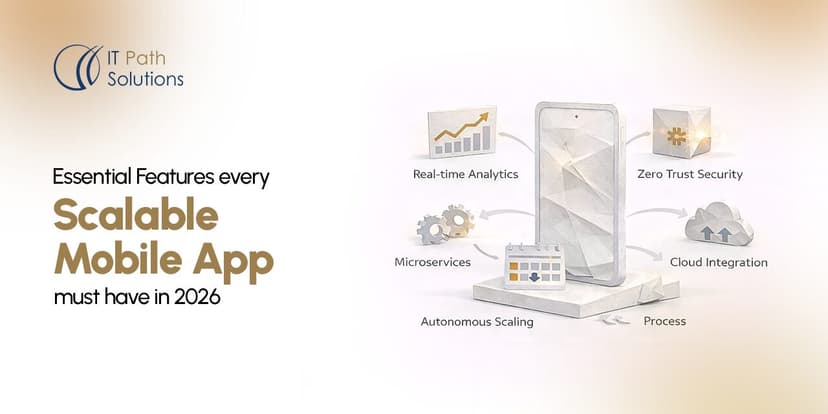
Essential Features every Scalable Mobile App must have in 2026
Let’s start with a situation most product leaders recognize. It is early 2026. Your mobile app has finally found traction. Daily active users are climbing. Marketing campaigns are working. Investors are optimistic. Then something breaks. Screens take too long to load. This happens during peak hours. A payment fails silently. A security audit flags basic… Essential Features every Scalable Mobile App must have in 2026
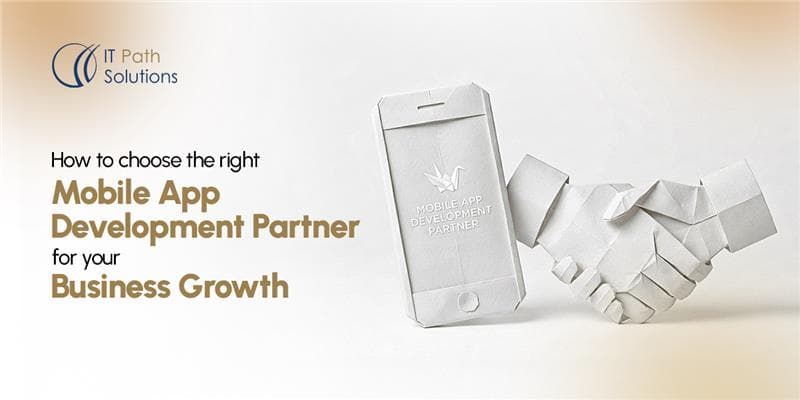
How to choose the right Mobile App Development Partner for your Business Growth
Let’s start with a story that haunts the IT industry. A well-funded logistics company decided they needed a custom mobile app to track their fleet. They did what most companies do: they Googled mobile app development company, sent out a generic Request for Proposal (RFP) to the top five results, and picked the one with… How to choose the right Mobile App Development Partner for your Business Growth
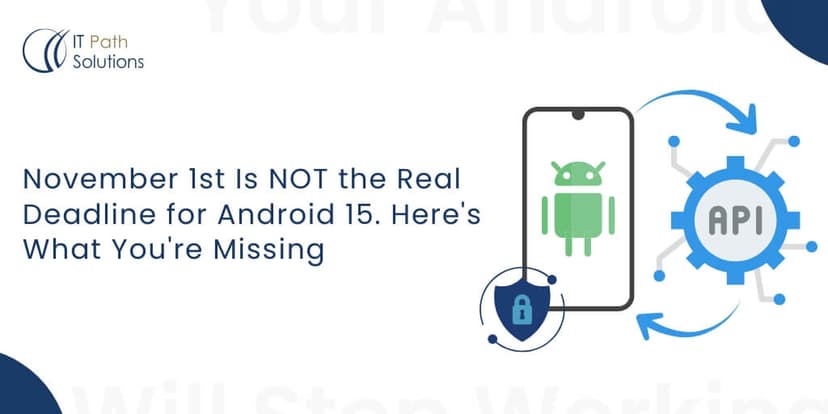
November 1st Is NOT The Real Deadline For Android 15. Here’s What You’re Missing
Imagine waking up one morning and discovering your Android app is invisible to millions of users on the Google Play Store. No installs, no updates, no revenue. Sounds terrifying, right? It is not a science fiction plot; it is the looming reality many businesses and developers could face in November 2025 if they neglect the… November 1st Is NOT The Real Deadline For Android 15. Here’s What You’re Missing
